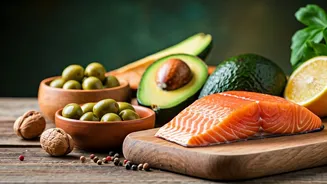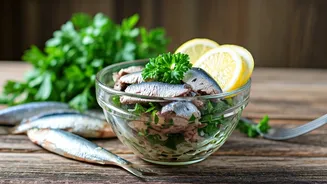HDL Cholesterol Defined
HDL cholesterol, often hailed as the 'good' cholesterol, plays a crucial role in maintaining a healthy heart. It functions by collecting excess cholesterol from
the arteries and transporting it back to the liver, where it can be processed and eliminated. This action helps prevent the buildup of plaque in the arteries, reducing the risk of heart disease and stroke. High levels of HDL cholesterol are generally associated with a lower risk of heart-related problems. Therefore, boosting your HDL levels is a proactive step toward improved cardiovascular health, a key factor in overall well-being and longevity.
Olive Oil's Heart Benefits
Olive oil, a staple in Mediterranean diets, is packed with monounsaturated fats and antioxidants. These components help increase HDL cholesterol while also lowering LDL, or 'bad' cholesterol. Regular consumption of olive oil supports overall cardiovascular health. Adding olive oil to your daily meals, such as drizzling it on salads or using it for cooking, can be a simple yet impactful way to incorporate heart-healthy fats into your diet. It's not only beneficial for cholesterol management but also contributes to improved blood vessel function, making it a valuable addition to a heart-conscious lifestyle.
Avocados for Heart Health
Avocados are another excellent source of monounsaturated fats, similar to olive oil. They not only help boost HDL cholesterol but also offer other health benefits. Avocados are rich in fiber, which aids in reducing LDL cholesterol levels. They are packed with vitamins and minerals like potassium, which helps regulate blood pressure, reducing the risk of heart disease. Including avocados in your diet can be done through various means, from adding slices to your salads, blending them into smoothies, or simply enjoying them as a snack. Their versatility makes them an easy and delicious addition to any meal plan.
Fatty Fish's Omega-3s
Fatty fish, such as salmon, mackerel, and tuna, are loaded with omega-3 fatty acids, which are incredibly beneficial for heart health. These fatty acids not only elevate HDL cholesterol but also reduce triglycerides, another type of fat found in the blood that can increase the risk of heart disease. Omega-3s have anti-inflammatory properties that support healthy blood vessels. Consuming fatty fish a couple of times a week can significantly improve your heart health. If you're not a fan of fish, consider taking a high-quality fish oil supplement to get the benefits without the taste.
Nuts and Seeds
Nuts and seeds, including almonds, walnuts, flaxseeds, and chia seeds, are packed with healthy fats, fiber, and other nutrients that support heart health. They help increase HDL cholesterol levels and can lower LDL cholesterol. These nutrient-dense foods can be easily incorporated into your diet. Add a handful of nuts to your cereal or yogurt, sprinkle seeds on your salads, or eat them as a snack. Their convenience and nutritional benefits make them a great addition to your daily diet. However, it’s important to consume them in moderation due to their calorie density.
Whole Grains' Role
Whole grains, such as oats, brown rice, and quinoa, are rich in fiber, particularly soluble fiber, which is highly effective at lowering LDL cholesterol and raising HDL cholesterol. They also provide essential nutrients and keep you feeling full longer, helping in weight management, another factor that supports heart health. Replacing refined grains with whole grains in your diet can significantly benefit your heart. Starting your day with oatmeal, choosing brown rice over white rice, and incorporating quinoa into your meals are excellent ways to boost your intake of whole grains.
Beans and Legumes
Beans and legumes like lentils, chickpeas, and black beans are excellent sources of fiber and plant-based protein. These foods contribute to improving HDL cholesterol levels and reducing LDL cholesterol. The fiber in beans and legumes slows the absorption of cholesterol into the bloodstream, reducing the risk of heart disease. They're also a great source of other important nutrients. Adding beans and legumes to your diet is simple and versatile, from adding them to soups and stews to incorporating them into salads. Their nutritional value makes them a valuable addition to a heart-healthy eating plan.















